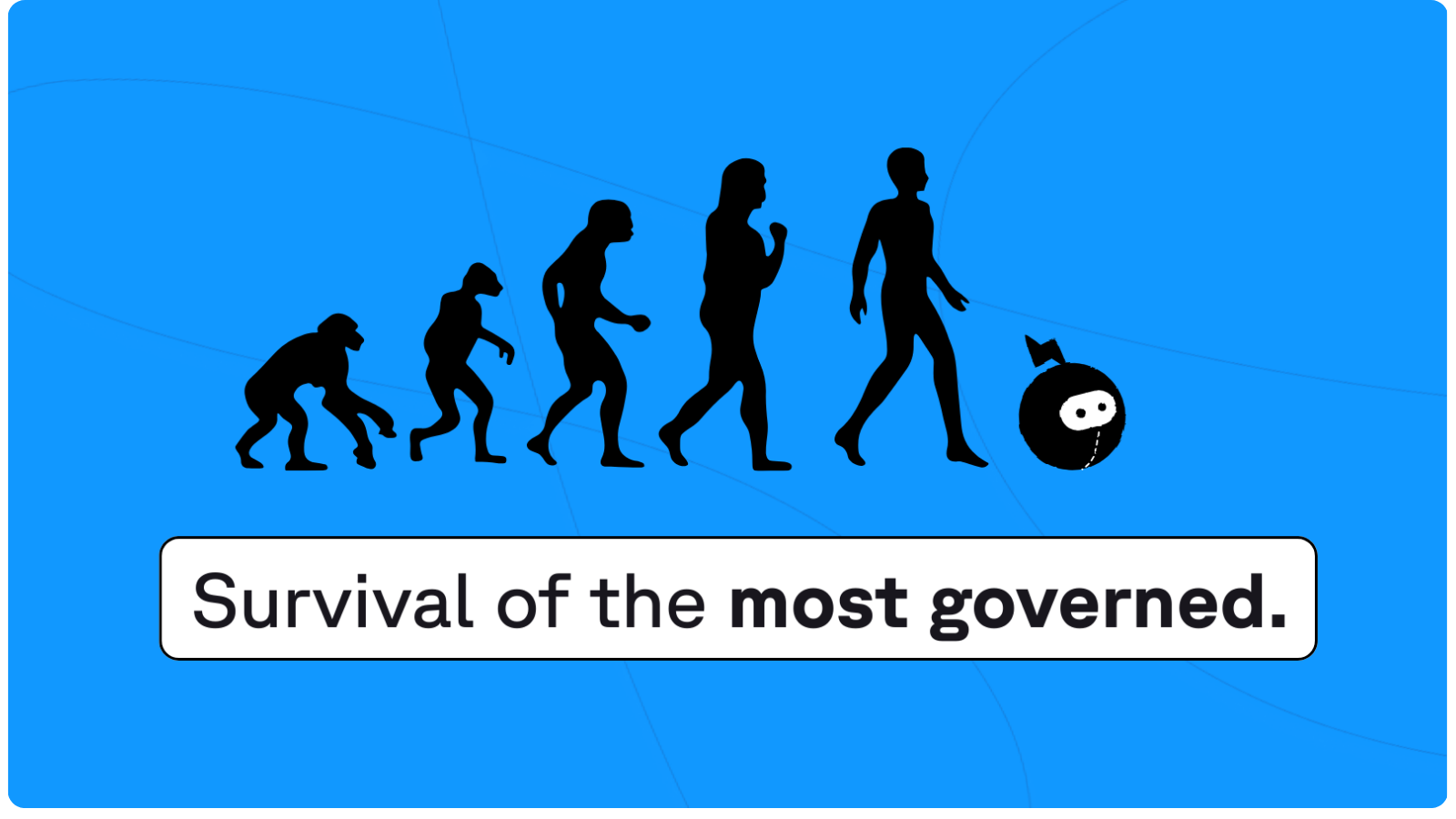TL;DR: Operational evolution favors organizations with governance, clarity, and metadata-driven automation — everyone else eventually collapses under the weight of their own complexity.
Welcome to the new natural selection
In nature, extinction is never sudden. Well, discounting asteroids.
It’s usually incremental — an accumulation of missteps, maladaptations, and environmental pressures that compound until a species simply can’t move fast enough to survive.
Enterprise operations work precisely the same way.
Most companies don’t implode because of one catastrophic failure. They fail because — over years — systems entropy builds and builds: a field here, a flow there, a patch stuffed into a gap the team swore they’d clean up later and before long, your CRM is a museum of fossilized processes, orphaned integrations, and invisible dependencies.
And then a shock hits. Boom. AI arrives, the economy shifts, complexity compounds, leadership demands velocity — now.
In that moment, companies separate into two evolutionary branches:
- The utterly governed: orgs that treat metadata as a managed, living organism.
- The utterly doomed: orgs that treat metadata like an eternal junk drawer.
This is Ops Darwinism — and only the governed survive. 😎
The environment has changed (and so have the predators)
AI is an ecological shift. The moment Salesforce dropped Agentforce 360, the rules of survival changed. Agents don’t click UI buttons or navigate around weird admin “workarounds.” Agents act on metadata context — and metadata does not lie.
Suddenly:
- Every skipped governance step becomes a broken automation.
- Every ignored dependency becomes a blocked workflow.
- Every missing owner becomes an unresolvable exception.
- Every poorly named field becomes an AI hallucination risk.
In the old world, you could get away with sloppy operational adaptation.
In the agentic world, sloppiness is a death sentence.
In the end, despite the beard, Darwin wasn’t being poetic. He was being literal. Fitness means responding to environmental pressure faster than your competitors.
AI is that pressure.
The Hidden Law of Enterprise Evolution: Compounding Complexity Always Wins
Companies assume they’re evolving because they’re “adding capabilities.”
But capabilities aren’t evolution in and of itself — they’re more like mutation. And mutation without governance eventually generates fragility.
Let’s run the metaphor:
- Add a field → a mutation.
- Build a flow → a mutation.
- Integrate a system → a mutation.
- Patch a bug with a workaround → a mutation.
- Ship a Q4 “must-have” customization → mutation with a side of chaos.
One or two mutations? Fine. Okay.
Ten years of mutations with no governance? You’re the operational equivalent of a dinosaur with five kidneys, two pancreases, and a ribcage made of Velcro.
Your growth created the conditions for your collapse.
This is why most orgs hit the same point of systemic failure around 200–500 Salesforce users. Darwin would call it carrying capacity. We call it systems drag.
The Great Filter: Governance vs. Velocity is a false choice
Legacy thinking forces ops teams into a self-destructive binary:
- Move fast and break things
or - Govern everything and slow the hell down
But AI-era enterprise doesn’t reward speed or compliance alone.
As it turns out, it rewards compounded velocity, and that only emerges when governance and automation reinforce each other.
Governance is not friction. Governance is adaptation — the ability to move fast responsibly.
The companies that are going to win in 2026–2030 are the ones treating governance as their evolutionary advantage.
They’ve accepted a hard truth:
If your metadata isn’t governed, your AI cannot execute.
Which leads to the central law of Ops Darwinism:
Organisms that cannot organize themselves cannot survive environmental change.
The Ops Hierarchy of Survival
(AKA: Why your org is either evolving… or already a fossil)
There are four maturity tiers in modern operations.
Only two will make it.
Tier 1: The Reactive Organism
Everything is tribal knowledge. Admins guess. Systems contradict each other. Decision-making is intuition and panic.
Extinction Risk: 10/10
Tier 2: The Well-Meaning Mutant
Some naming conventions. Some documentation. Some dashboards no one checks. Feels “fine” right up until AI breaks everything.
Extinction Risk: 7/10
Tier 3: The Governed Organism
They treat metadata as a living blueprint. Dependencies mapped. Owners defined. Change logged.
Extinction Risk: 2/10
Tier 4: The Agentic Organism (The apex predator)
Systems are coherent, automated, and observable. Agents navigate metadata cleanly, make decisions accurately, and move work autonomously. Ops becomes a competitive advantage, not an operating cost.
Extinction Risk: Almost zero
If you’re not already at Tier 3 or 4, your competitors will eat your lunch. Amd then probably you.
So how does one survive?
In biological evolution, species don’t survive because they’re bigger or smarter. They survive because they adapt faster. And in enterprise evolution, adaptation = governed metadata + automated operations.
This is exactly the design principle behind Sweep.
We don't just surface your metadata. Our platform organizes it, traces it, explains it, governs it, and powers agentic automation with it.
Not someday. Not in theory. Today.
Customer example after example tells the same story:
- 99% faster debugging: because dependencies aren’t a scavenger hunt
- 58% lower TCO: because automation is built on clean metadata
- 5× ROI on AI initiatives: because agents know where the truth is
- Fewer outages, fewer regressions, fewer cycles lost to tribal rewrites
Talk about a survival strategy. 🐯
The Future belongs to the governed
Ops Darwinism is equal parts real and brutal. It doesn’t care about headcount, revenue, niche, or industry prestige.
It simply asks: Can your org adapt to change faster than the environment changes around it?
AI is the environment. Metadata is the DNA. Governance is the strategy.
Sweep is the mechanism.
If you want to evolve into an agentic organism (fast, resilient, and unburdened by drag) now is the time.
Because only the governed will survive.

